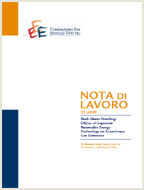Cost-Reducing R&D in the Presence of an Appropriation Alternative: An Application to the Natural Resource Curse

03.04.2013
Klarizze Anne Martin Puzon
O13, Q33, P48
Innovation, Appropriation, Natural Resources
Climate Change and Sustainable Development
Carlo Carraro
This study proposes a new mechanism for the resource curse: crowding-out of innovation due to the existence of an option to engage in conflict. Using a game theoretical framework, it is argued that an increase in the amount of natural resources (in the informal sector here conflict for a common-pool rent materializes) reduces the incentives of entrepreneurial groups to engage in cost-reducing R&D (in the non-resource sector where production occurs). Compared to most models of the resource curse, the impact of resource abundance on income and welfare was interestingly observed to be non-monotonic. An increase in the amount of resources in the common pool induces intensified conflict among groups and less R&D investment. Depending on the relative strengths of the income and diversion effects, three scenarios were exhibited. First, there is a 1.) Pure Blessing. This happens when both the extent of technological spillovers and the initial level of resource are low. Starting from scarcity, the increase in natural resource generates an overall jump in the groups’ income levels. Even if an increase in resources decreases innovation in the formal sector, both income and welfare still go up. Meanwhile, for intermediate initial values of the natural resource, there is a 2.) Pseudo-curse. A resource boom induces an immediate income effect. However, this income gain is dominated by the indirect diversion effect due to lower output and higher price (because of less cost-reducing R&D). Consequently, while income increases, the welfare of the economy decreases. The range of resource levels where this occurs is greater when spillovers are high. Finally, a 3.) Double Curse occurs for extremely high initial levels of natural resources. Both aggregate income of the economy and welfare suffer.
